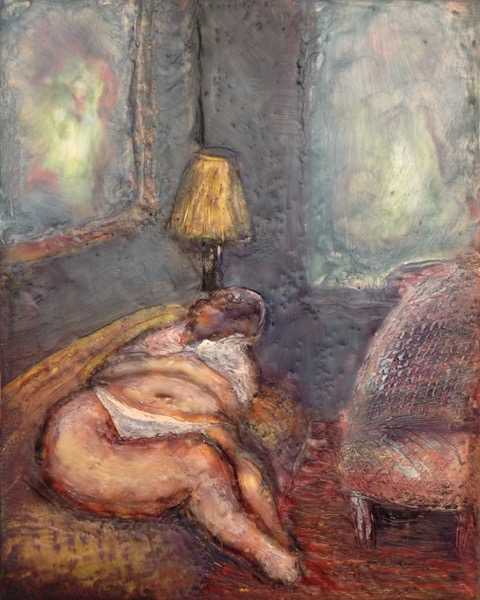Two Weeks a Smoker
Personal Essay by Lauren Fadiman
See your friend and fear you are losing her. Petra: two spaghetti-strand arms—loose and familiar—and two carefully pursed lips. Your conversation has ebbed and flowed like the water cycle. There was the flood last fall—a cavalcade of words—and now there is generally the barren dryness and the parched mouth and the dying of crops. Sometimes comes the merest specter of rain, like drops of water plummeting from an AC-unit to the sidewalk below—and you will remember, in those moments, the synchronicity you felt with her last November. (Other times, you will eat dinner in silence. Know that it is your fault.)
You are on the sidewalk now, right now, heading uphill at at a 30-degree angle. Petra is rushing toward you, hair wet. Smile small with two carefully pursed lips. You are sad these days, after all, and want people to know. You think Petra may be sad, too. Everyone is sad these days, it seems to you. Like the extension cord of life can’t quite reach the nearest outlet—or like the primordial soup in which you all swim has cooled and grown skin along its milky surface. Or, more simply, like you and everyone you know have long struggled with mental health problems that can’t be summed up in this or any pithy analogy.
Say hey. Say how are you? Say good, which is both answer and affirmation. Smile tightly and softly at each other, and fill the space with words. Cut to the chase, even though you don’t know what the chase is. Ask her if she wants a cigarette. (As if you have ever smoked a cigarette.) When you first locked eyes with Maria in the fall of your freshman year of college, a breeze blew in from the window behind her. A cloud of gray smoke wafted in your direction, and your asthmatic lungs twitched with wrenching force. Your eye contact broke. You doubled over. And you did not speak to her—not then. Eventually, you will come to know that she is soft-spoken and capable and neither like nor unlike a marble pillar—but not in that moment, not then.
It occured to you in the spring that most of the women you look up to, smoke. They are aloof and well-dressed and deft-handed and long-fingered, and they carry their shoulders with a grace you appreciate so much that your admiration flirts with envy. When you see them at parties, they grip you—hard—on the shoulder, and smile. And toward the end of freshman year, one of them drunkenly tells you that she believes in you. (I believe in you, too, you say, dumbly.) You and Petra thought and spoke about these women all year long, though, beginning long before this bittersweet culmination in the spring—considered each other’s text conversations, tracked your own movements in the wake of these other girls. Felt unspeakably lucky to be among such brilliant people and tread lightly between them.
Eventually you will learn to see them as human foremost, a thing your veneration had initially—embarrassingly—rendered difficult. Last year, you were content to exist on the periphery of their lives and simply bear witness to them—try to understand, synthesize, their movements through the world. One of the things they do best, you decide, is perform themselves: and the cigarettes are a part of that, are a way of filling the room even without words. Time and again you have had no choice but to walk through their breath manifest. These women are in-your-face about their presence, and in-your-mouth and in-your-throat and in-your-lungs about it, too. They occupy space unrepentantly. This, they tell you, is something that they want for you as well. And so when you smoke for the first time, it is the collective image of these women upon which you will clumsily superimpose yourself—as though this is the thread of continuity, as though this is how you can best emulate their occupation of space: by picking up the cigarette where they left off, by drawing a visual parallel between yourself and them. You feel untethered their guidance, feel not unlike the poorly balanced three-legged stool that stands wilting in your common room. It is hard for you to imagine ever filling the rooms these women once ruled, and so you resort to posturing: wear a lot of black these days, drag eyeliner heavy across your blue-veined lids, try and fail to quit biting your nails. You still press two fingers to your pulse when you get nervous, and it still flutters erratically in response. But if someone sees you from a distance, all they will see is the black and the eyeliner and the cloud of smoke. No one will notice your ragged fingertips. No one will notice the bobbing Adam’s apple of your heartbeat. You will consider this a win. (But only because your metric is faulty.)
You had wanted to acquire some earlier in the day—the cigarettes—back when you first suggested the idea, but Petra didn’t have her fake on her then. A shame, you said, you smiled wryly. It is something that you, in particular, have been wanting for a while—and your sense of irony is all but lost. But Petra will have her fake on her when you bump into her for the second time that day, and you and she and Andrew will slump into the convenience store just before the lateness of night becomes the earliness of morning. (Slump is an appropriate word, isn’t it, what with the nebulous multiforms of so-called Sophomore Slump constituting the latest ur-sadness of you and your nineteen-year-old peers.) You will settle with them on a stone staircase that is cold and hard against your back, allow yourself the transgressive pleasure of being taught to do a new misdeed. You have grown to enjoy this perversity, this weird commingling of didacticism and substance abuse. It makes you feel both young and old. Let Andrew light your cigarette, his thumb flicking the lighter like a trigger. It will take him three tries, the wind coming in dry and fast. Suck in, quick, he will urge you, and you will do so, and you will feel smoke wash the back of your throat. There is a ghost inhabiting you, a raspy spirit, it wafts out in every breath. Good. Laugh. Ash the cigarette after every puff because you don’t know any better.
It is false intimacy. Petra lights her cigarette off of yours, touching it to this extension of your mouth. Remember the night in February when she got drunk and bit your cheek, hard, so that the dent of her incisors lingered on your flesh for ten minutes and your eyes watered against your will. Think about how you are using cigarettes as a proxy for talking now, and a proxy for things to talk about. About how you and she were nearly inseparable last year, it seemed, about how you were at all times in phalanx with other women—about how geography and graduation and the dull granulation of time has changed all of that, and you can’t now seem to recalibrate the creaking wheels of your life.
Smoke your second cigarette that night, too, this one with Maria beneath an open window, its drifting curtains. She is one of the few remaining of these older women for whom you care so much. When you are sad that night (the result, most of all, of your inability to make choices and live with them), she will wrap her arms around your whole body—and you will think then, for a few moments, that you understand each other very well. When you exhale, there will be no words on your breaths—but all the smoke will commingle into a single cloud.
There was a time when you hated the smell of cigarettes. Used to associate them with too-loud neighbors and too-hot summer days, with your cousins who started smoking as children and never stopped—coughing through a pack a day or two packs a day, leaving the stubs to sit like a mouldering centerpiece on the kitchen table. But you will not think about them when you begin to smoke yourself, because you have been all-too-willingly brainwashed by campus rebranding: cigarettes are not dirty or dangerous or hick here—they’re cool again, you know? They’re hip, gritty—so long as the people smoking them are appropriately rich and appropriately troubled. (Remember that you are not rich.)
At least, that is what you said one year ago to the kids you babysit, when they asked you why so many people around the Yard smoke: that it’s an aesthetic thing, you figured, and a social thing. How else will the sad English concentrators find each other? you asked, snarkily. The children’s father brought up e-cigarettes then, and you went to wash the dinner dishes. This was months before you smoked for the first time, back when it was still easy for you to say things and stand by them.
But these days, you are quick to make excuses for yourself. And so you dress the cigarettes up as all kinds of things in conversation: as a communal experience shared between friends and strangers (The breaking of breath rather than bread, as though wordplay is ever a good defense), as a method of marking one’s age (As if sophomore year were significantly different from freshman year, a reluctant acknowledgment), as a way to ensure your sadness is taken seriously (No one ever takes women’s sadness seriously, you complain, unless they lash out somehow). The last of these is the most truthful—because it seems that all you feel these days is torpidity, and lung cancer is the clearest and most visceral character arc you can see laid out before you. There’s a hell of a lot of precedent for it. And you’re not about to reinvent the wheel.
Female sadness is the only gendered abstraction you want to talk about anymore. When you are sad this fall, other people apparently assume that you hate them. Your withdrawal is taken as a sign of attack. When one of your male friends grows sad, he starts breaking things. People understand that he is just sad.
You wonder sometimes if an unperformed emotion really exists at all. Can one emote endlessly into the void? Are emotions not like radio waves, bound to collide with matter in order to actualize? Doesn’t language mostly exist so that the highly privileged have a medium through which to complain, without end, about their vague-but-crippling sense of ennui? And isn’t sadness only real, really, as a thing performed?
Here is why you start smoking: because all the saddest of sad boys you know do it, and the sad girls you know also do it, and you cannot think of any way to express the implosion of loneliness you are experiencing besides by channeling other people. You have always been reserved (Hard to read, someone will say to you in September, you’re really hard to read, LG), but now you find yourself—inexplicably—wanting to occupy space, to fill a room with your beige and brown feelings of enervation. You remember all the women who have encouraged you to do this in the past year, remember the earnestness in their voices. It occurs to you that you have talked a hell of a lot of people through their own various lethargies this past year—and you are desperate, suddenly, to be on the receiving end of this treatment.
When some of your friends try to numerically rank the saddest people you know in common, the top slots are occupied by men of all sorts: the vocal and the quiet, the philosophers and the pragmatists—there is no rhyme or reason to their placement in this hierarchy of gloom. The highest-ranking women are all smokers, though, whether they self-identify as sad or not. Something intuitive becomes clear to you in this moment. And you are surprised that it has taken you quite so long to understand.
Call sadness a currency. It is its own small form of social capital in the world you have unknowingly entered in college. Plenty of people who make art or slam poetry or compose music seem to do so out of sadness. And you, with your tight lips, have been absent from this economy for a long time. People tell you that you have a friendly face. You wonder whether any of the things you say are taken seriously because you say them with your cheek-aching smile. You are forever performing reluctant optimism, unable to break the cycle without a tragedy of some kind—or at least a good prop.
Smoking is like a cheat-code. Every cigarette you put in your mouth contains seventy carcinogens and at least as many ambiguous cultural associations. No need to say I’m sad and really serious about it when you’re halfway through a pack on a Tuesday night. Everyone will already know.
There is a burn on your arm where you let someone put out a cigarette on you once, back before you had ever smoked yourself. (Sometimes you forget you were not, in fact, born with it there—that it is not a birthmark, but rather a choice you consciously made. An indulgence of curiosity that you are not unhappy to have imprinted on your skin, that you do not regret.) It has mottled and faded since its application to look like one of those old-fashioned vaccine scars, and people of a certain age will be surprised to see it mirrored between your arm and theirs. You will never be able to explain the truth of it, and so you will nod along with whatever narrative they spin. At least I’ll never get smallpox, you’ll say, and they’ll laugh.
And why not start smoking, when the imprint of a cigarette will exist on your left bicep for the rest of your natural life—when this shadow is the only tattoo you’ll ever have. Why not keep smoking when you and your roommate adopt a pack and share custody of it, swapping it between backpacks every few days. When you go to a birthday party and are loitering on a fire-escape, and someone asks for cigarettes—when you are the one to say, Yeah, I have some, and flick your ashes through the grated metal below your feet. When someone asks you for a lighter on the street and you say, Yeah, I have one, and you flick it like a trigger one time, twice, three times.
But still, you quit after two weeks. You are too afraid of the medical consequences, turned off by the price, worried that the family for whom you babysit will smell the smoke in your hair. You are neither troubled enough nor rich enough to smoke, and your sadness is more ephemeral than existential it turns out. (Growing pains, maybe—so you schedule a counseling appointment and go to bed early and try to remember to drink enough water.) You figure you would rather talk to all the women you miss than perform their old tics. Plus, you’ve just hooked up with a boy who prefers those dumb weed pens to cigarettes and tells you so. And your mom thinks you’re being an idiot.
So you give your roommate the pack for keeps, and return your lighter to the windowsill next to the cotton-scented candle. When a boy you like offers you a cigarette—even though you want to impress him, you really do—you tell him that you’re off of them for good. He laughs at you, and you shrug. I’m back on the Lord’s path, you say and mean it. But when you walk home that night, you smell smoke in the street, and feel—just for a moment—the violent belly-shudder of familiarity.




